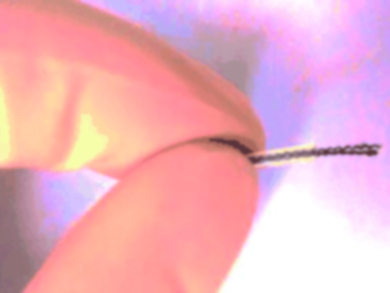Implantable bioelectronic sensors allow real-time monitoring of substance concentrations in vivo. However, developing sufficiently miniaturized sensors with the required accuracy of measurement and biocompatibility is a considerable challenge.
Frank N. Crespilho, University of São Paulo, Maria C. Almeida, Universidade Federal do ABC, Santo André, both Brazil, and colleagues have developed and tested an implantable glucose sensor based on flexible carbon fiber electrodes (FCFs). These fibers have promising characteristics for use in microelectrodes, namely their flexibility, conductivity, and the ability to immobilize a large quantity of enzymes used for measurement on the porous electrode surface.
The researchers immersed FCF electrodes in a combination of neutral red and the enzyme glucose oxidase to allow the measurement of glucose levels. The neutral red acts as an electrochemical mediator, improving charge transfer at the electrode surface. For in vivo testing, the resulting biochip was implanted into rats’ jugular veins using a catheter, and glucose levels adjusted by injections. The chip was able to monitor glucose concentrations in the rats’ blood in the range between normal and diabetic levels (30 – 200 mg dL–1), showing promise for future applications.
- Glucose Biochip Based on Flexible Carbon Fiber Electrodes: In Vivo Diabetes Evaluation in Rats,
Rodrigo M. Iost, Fernanda C. P. F. Sales, Marccus V. A. Martins, Maria C. Almeida, Frank N. Crespilho
ChemElectroChem 2015.
DOI: 10.1002/celc.201402339


